By Andrew Humphries
In Uniting Church faith communities right around the country this Sunday, women ministers will take centre stage as they spread the word of God, just as they have done since the church’s formation in 1977.
There is nothing unusual in that and, in fact, so widespread are female ministers in our church that we almost take them for granted.
Yet, in other religions, there is no place for women in positions of serious influence or responsibility, as a “boys-only” mindset holds sway.
Earlier this year, eyebrows were raised when it was announced by Pope Francis that Catholic Church law had been changed to allow women to carry out more duties at Mass.
It was made clear, though, that the priesthood was still a bridge too far for these women.
In the Uniting Church, however, the role of women as ministers is warmly welcomed, accepted and embraced.
So, what is it like to be a part of a church that accepts women ministers so freely and ensures they are such an important part of the fabric?
Who better to ask and take us on a journey of faith than three female ministers based in regional Victoria, metropolitan Melbourne and Tasmania, whose own stories go to the heart of being “women in ministry”.
As a teenager, Cynthia Page recalls often crying in church each week while singing the final hymn.
That memory is still a vivid one for her and it goes a long way towards explaining why now, many years later, she is the minister at Eaglehawk Uniting Church in Bendigo.
Those tears were a sign that, even at that early age, Cynthia was hearing a call from God to serve in some capacity.
“Quite often at a service the final hymn was a rousing one and, yes, it would often bring me to tears, so already for me there was this strong sense of wanting to serve God,” Cynthia says.
Banyule Network of Uniting Churches minister Sandy Brodine’s sense of calling also came at a young age and, like Cynthia, it was the church service that had a profound impact on her.
“My first memory of being aware of a call to ministry came as a small child and it’s quite an unusual memory because I attended an Anglican church with a priest, Father John, who was most definitely a male,” Sandy recalls.
“I have a very strong memory of watching him offer communion and being very aware that was where I was drawn to be.
“I had a very strong sense of being drawn into that and it was a very peculiar thing because I wasn’t then a member of the Uniting Church, which did have women ministers, and I had never seen a woman minister, but there was still that strong calling.”
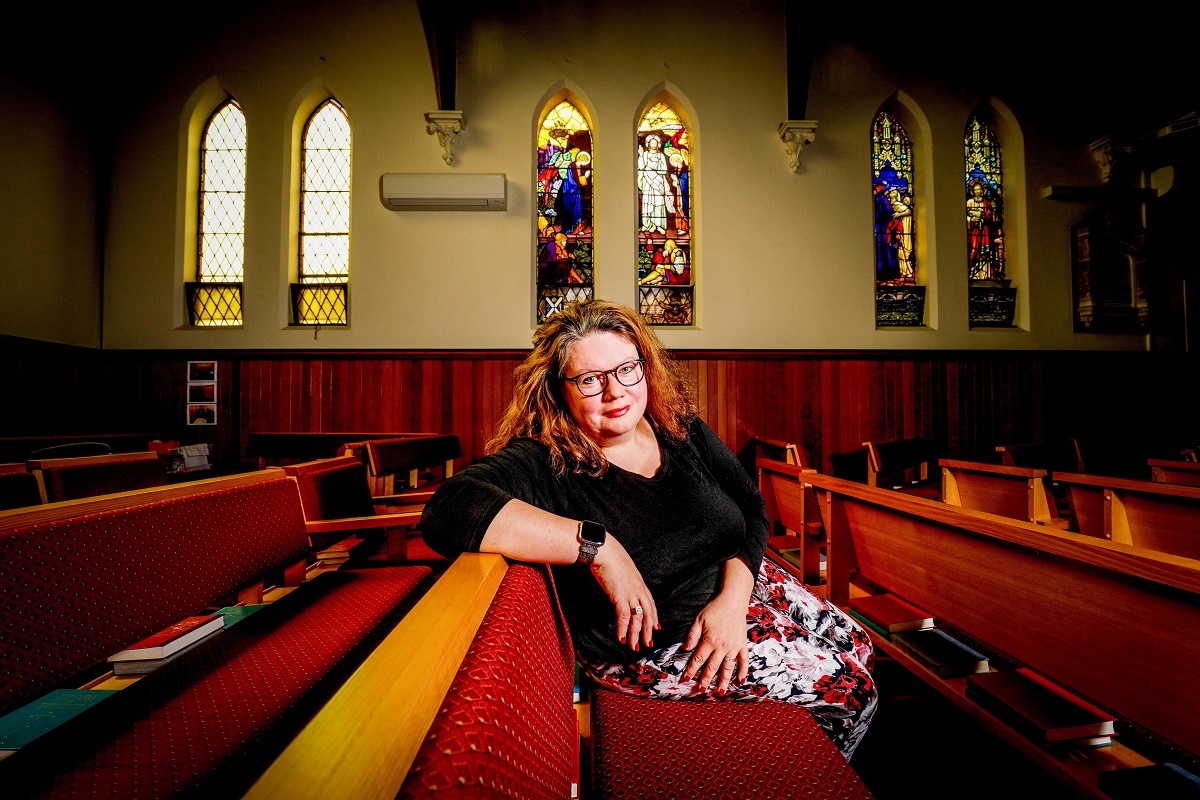
Sandy Brodine is one of the female ministers lighting the way within the Victorian and Tasmanian Synod.
That sense of calling grew stronger as Sandy became older and she became a member of the Uniting Church, mainly because of the pathway it offered to ministry for women.
“From the age of about 15 I was very definitely drawn to a church that ordained women,” she says.
Tasmanian minister Sherrin Jackman’s path towards ministry was a longer one and, while she was active within the Uniting Church as a child, it was much later in life during a career in nursing that the call to God grew too strong to ignore.
“I went into nursing primarily because I felt it was something I could do for God,” Sherrin says.
“So I worked as a nurse/midwife for many years in Tasmania, South Australia and the United Kingdom.”
Sherrin felt at that stage her calling was towards missionary nursing and it was while working in Niger, in west Africa, that she began to feel God’s call.
“While I was in Africa I did some preaching among the missionary community and a couple of people said to me, ‘look, you’ve got a real gift for this’,” Sherrin says.
“Years earlier, people had asked me about going into the ministry and my reply was always, ‘no, no, nursing is my thing’.
“But while I was in Africa I began to think, okay, it’s like the Lord is saying ‘I’ve got you this far, you’ve learned all this stuff along the way, now this is what the next step is going to be’.”
National Assembly President Deidre Palmer says the Church’s affirmation of the ordination of women is foundational to its identity as the Uniting Church.
“It has been a joy to see the fruits of nurturing girls and women in a church, which affirms the equality of women and men and the mutuality of lay and ordained ministries – a discipleship of equals,” Deidre says.
“Women are expressing their Christian discipleship as they respond to God’s call to ordained and lay ministries, and to various forms of leadership in the life of the Uniting Church and in the wider society.
“Women are offering their gifts in all aspects of ministry and mission including education, pastoral care, preaching, teaching, advocacy, administration, worship, justice and peacemaking.
“They are living out their Christian vocation in their workplaces, communities, neighbourhoods, families and on a broader global stage – as teachers, ordained ministers, chaplains, play group co-ordinators, accountants, lawyers, parents, community organisers, social workers and in international development.
“If you’re a girl growing up in the Uniting Church, you don’t think ‘maybe I can’t do that because I’m a girl or a woman’, instead there is an opportunity to think ‘I’m going to express the gifts that God has given me in whichever way I’m called and the Church will support, affirm and walk alongside me’.”
Sandy says one simple word sums up the UC’s attitude to, and support for, women ministers: acceptance.
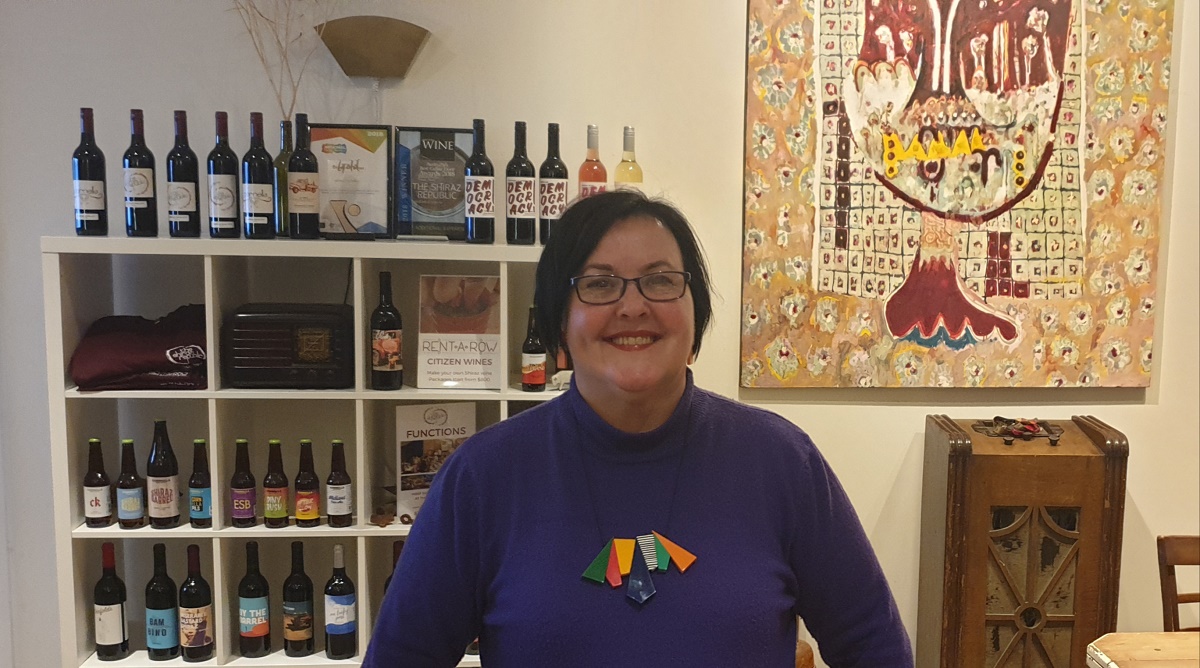
Cynthia Page is Eaglehawk’s first female minister.
“The Church embraces women in ministry (and supports them), it’s as simple as that,” she says.
And, in turn, female ministers offer great support to those women about to take the same journey, as was the case for Sandy.
“My experience was quite fortunate in that I was ordained in 2012 after applying for candidating in 2007, so by that stage there were many women in ministry who were very strong role models,” Sandy says.
Cynthia says while the Church, in general, has good support networks in place, ministers need to also take responsibility for ensuring their own needs are met.
“It’s great that the church provides for us, but we also have to take responsibility to work out what it is that we need, and to seek it,” she says.
“I’m very committed to Supervision and was, long before it was considered mandatory. It is one of the most helpful things for me.
“(It’s that ability) just to reflect with someone objective who has skills to help me look at something from other angles.”
So, are there special qualities that only women bring to ministry?
Is it a sense of empathy and understanding not always readily apparent in their male counterparts, or is that a generalisation and, frankly, disrespectful?
Cynthia laughs when she attempts to give her take on it all.
“Well, I have to be careful because there is some truth in that saying about men being from Mars and women from Venus,” she says.
“I think that, yes, there is some truth to that, but some women probably fit those traditional masculine stereotypes and some men do (well) what women stereotypically do well.”
Perhaps, says Cynthia, female ministers have more of a “feel” for the pastoral care side of ministry.
As Eaglehawk’s first female minister, Cynthia knows from first-hand experience the different perspective a woman can bring to the role.
“When I first moved to Eaglehawk, partly to help make connections with the community, I started organising movie nights,” she says.
“I said people could wear their pyjamas, dressing gowns and slippers (Eaglehawk is very cold in winter) and so about 50 people attended one night and, at one stage, there was a huddle of women in the kitchen servery and when I approached them they said, ‘We had no idea what we had been missing out on’.
“I’m the first woman minister Eaglehawk has had in 166 years and these women were basically saying, ‘we just didn’t know there were all these things we were missing out on by not having a woman minister’.”
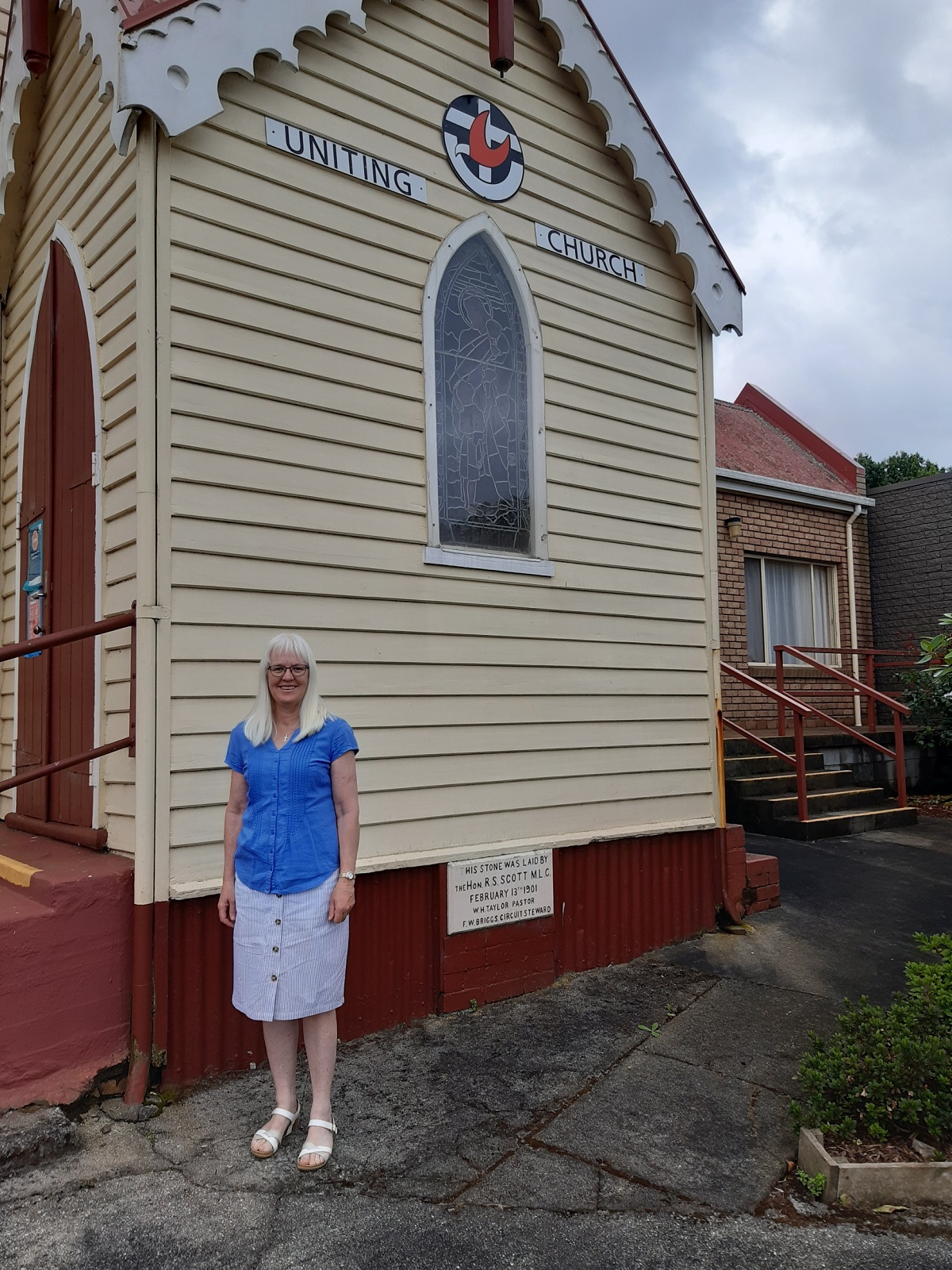
Sherrin Jackman’s nursing and midwifery background has helped her in her role as minister.
Like Cynthia, Sherrin suggests women ministers may be stronger in promoting the more pastoral side of ministry than their male counterparts.
“Maybe I’m stereotyping a bit here, but perhaps women bring a greater sensitivity to the role,” she says.
“I’ve certainly got a lot more energy than some of the other ministers or church leaders.”
For Sandy, it’s the sense of compassion that women ministers can bring that stands out as a strength for many.
“One quality needed is a sense of graciousness, as well as compassion, and to be present for people when they are wanting to express something that is a deep hurt or pain for them, whatever that might be,” she says.
“It is a deep responsibility in terms of walking beside someone and helping them carry a heavy burden.
“There is a real joy around being able to be present for someone who is really suffering and struggling.”
That’s a time, Sandy says, when the very best qualities of women ministers come to the fore.
“I think me and many of my colleagues bring a lightness of touch and a creativity to the role,” she says.
That role of pastoral care doesn’t extend only to members of the community, and Sandy is proud of the way many female ministers are quick to support each other.
“One of the things that women ministers in the Uniting Church do is look after each other, and we tend to support each other very well,” she says.
“We really connect with each other and check in with each other.
“I’m married but I know a number of female clergy friends who are single and we really watch out for each other and keep an eye out on how each of us is going.
“That’s really important and I think most female clergy would be really aware of keeping an eye out for other women.”
While the Uniting Church’s acceptance and promotion of female ministers is seen as progressive, ministers like Cynthia, Sandy and Sherrin sometimes face a battle for acceptance when taking part in inter-faith events.
That, they say, is not always an easy situation to accept, as Sandy explains.
“It has been difficult at times in inter-faith settings because it’s very strongly male-dominated and, at times, a female minister isn’t even noticed and is essentially invisible,” she says.
“As a Uniting Church minister, I am still often taken aback by that.”
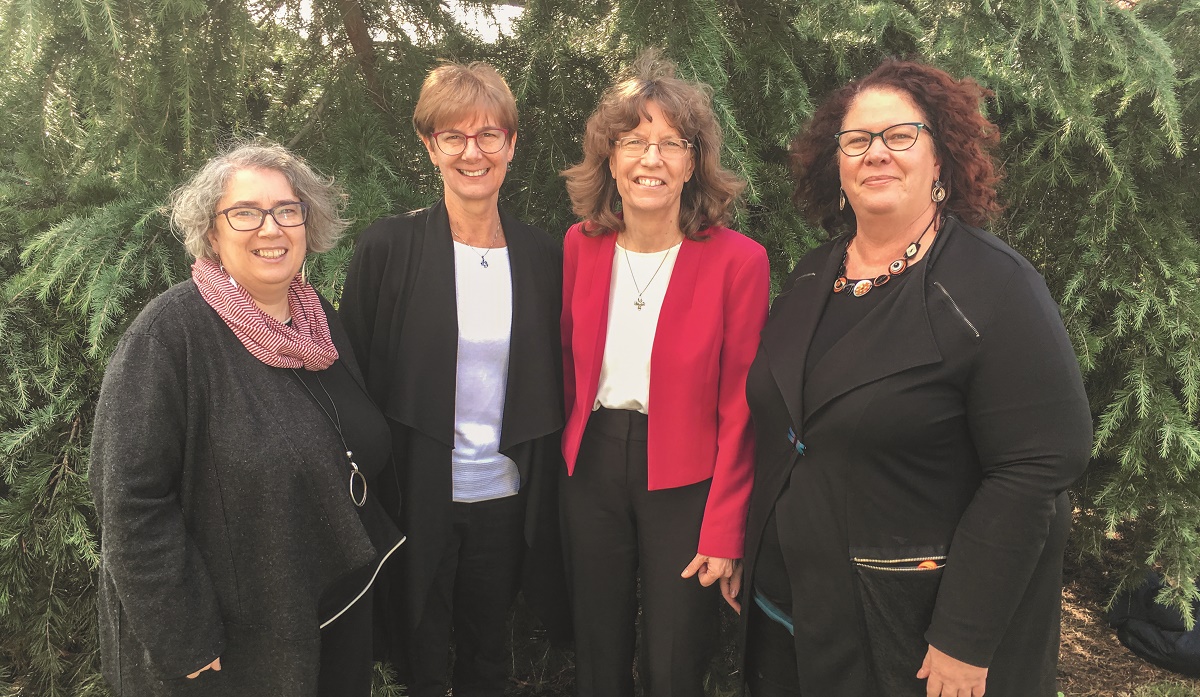
Women leading the way: National Assembly President Deidre Palmer, with former Moderator Sharon Hollis, current Moderator Denise Liersch and Assembly General Secretary Colleen Geyer.
Sandy points to an experience two years ago to prove her point.
“I was at an event as one of the guest speakers,” she recalls.
“Everyone was invited to the top table during proceedings, yet I wasn’t included in that and ended up sitting at the table with women, even though I was actually there as a member of the clergy and guest speaker.
“There was even a group photo, but they also failed to invite me up for that, and I was standing there watching this photo being taken thinking to myself, ‘they can’t even see me, they don’t even know I’m here’.
“So you do sometimes have those sorts of experiences in the wider community.”
Sherrin also knows that feeling and is sometimes forced into the role of diplomat when dealing with other religious faiths.
“I have worked with a couple of churches whose members aren’t comfortable with women in ministry and with women preaching,” she says.
“I have just had to accept that and step back from that and say, ‘okay, what will you allow me to do?’.”
Sometimes, says Cynthia, history itself can present the biggest challenge.
In her case, being the first female minister in Eaglehawk has brought its own pressure.
“Well, obviously I want to be a positive role model and advocate for women ministers,” Cynthia says.
“There is a board on a wall with all the names (of ministers) in gold on it, but my name isn’t on there yet. I’ve been here seven years so I figure (maybe one day I will be up there).”
In terms of challenges based on gender, Cynthia admits there may have been times when confusion, more than anything else, led to issues.
“I think that sometimes what happens is that it’s possible to misunderstand people and I can think of a couple of situations where I thought there was some resistance (to me) and maybe there was a slight bit of patronage,” she says.
“I later realised that what had looked like opposition to me was actually these good men looking out for me.
“It was a good reminder to be careful how you interpret your experiences. What you think is happening may not be what is happening.”
Despite the challenges, Cynthia, Sandy and Sherrin wouldn’t swap their jobs for quids, comfortable in the knowledge that the positives involved in their work far outweigh the negatives.

Female ministers embrace the opportunity to connect with congregation members and spread the word of God.
For Cynthia, it’s all about delivering a message around what joy God can bring to people as part of their daily lives.
“Mine is a lifelong passion to help people hear that God adores and loves them, so that’s definitely a driving force for me,” she says.
“Sometimes people can have been in the church their whole lives and not heard that message from God.”
The power of God’s message and how it can be delivered is also a part of her role that Cynthia loves.
“I like the challenge of crafting a message, in terms of studying scripture and theology, and making it accessible,” she says.
“That really is one of my passions, the sense that theology, like any language, can be used as power to keep knowledge with the elite and I don’t want to be the person who does that.
“I’ve just finished a Masters of Theological Studies and I want to bring what I’ve learned through that, but communicate it in ordinary language that anyone can understand.”
For Sherrin, the simple joy of sitting down and talking to people makes her a very happy minister.
As a former nurse and midwife, that sense of caring and sharing with others has come easily as a minister.
“It’s interesting that a lot of the caring stuff that is part of nursing and midwifery comes across into ministry,” Sherrin says.
“As a minister you’re still caring for people, but in a different way.
“One of the things I really loved about coming into ministry is that as a nurse and midwife you never really get the chance to actually sit down and talk to people.
“You’re constantly doing things that they need and then you had to rush off and do the next job.
“Sometimes I just wanted to be able to sit with people and hear their stories and I couldn’t do that, but now, as a minister, I can.”
There is no doubt, says Sandy, that all of the hard work involved in ministry is balanced by the many joys it brings.
“What I love most about being a minister is watching the light fall on people as their faith grows,” she says.
“It might be a moment when you’re leading a prayer group and people actually make the connection after a reading and say ‘yes, I understand now what that reading is about’.
“They are the moments I love and there are a surprising number of them as a minister.”
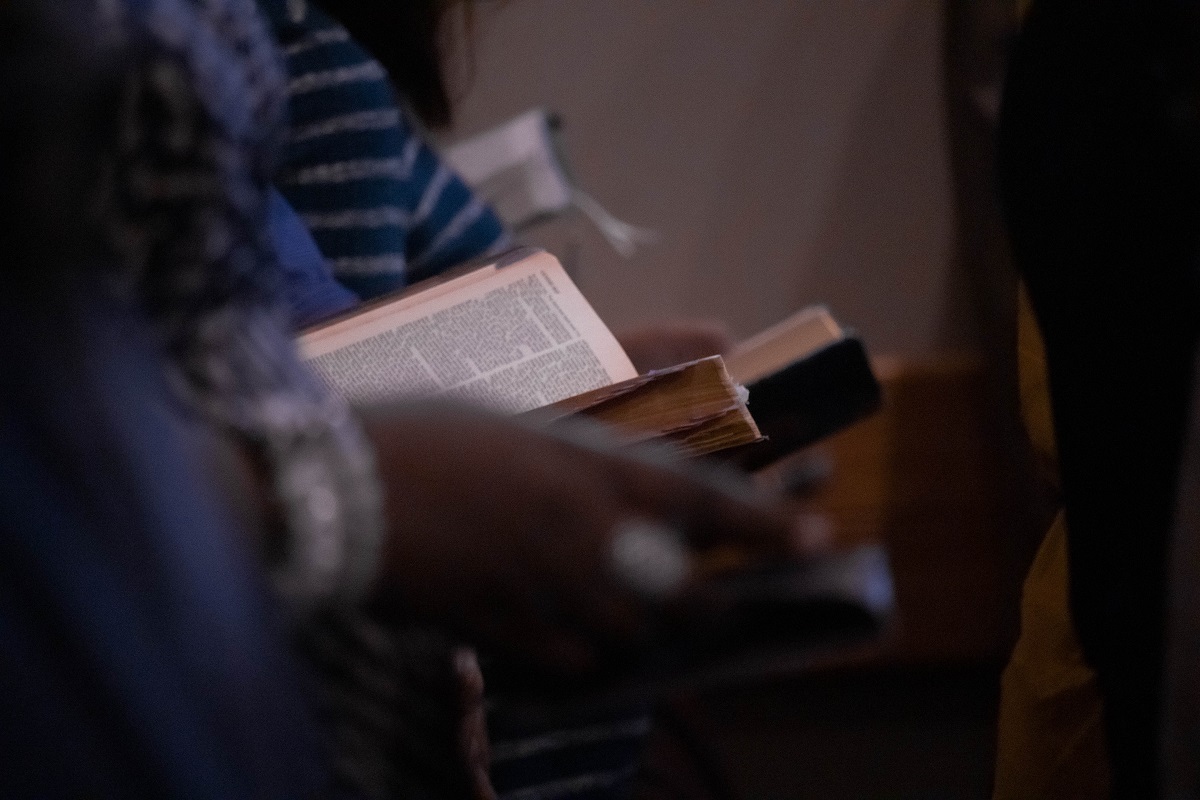
Sandy Brodine takes great joy in watching people embrace their faith journey.
As UC ministers, Cynthia, Sandy and Sherrin value greatly the fact that they are part of a progressive church that values women in positions of leadership.
Do they wonder, though, why that isn’t the case in a number of other religious organisations?
And why, in fact, some others seem so reluctant to make use of the gifts that women bring to ministry.
Sherrin says it may be something as simple as an outdated belief that men perform leadership roles best.
“I think from a Christian point of view some of the more ultra-conservative denominations are just stuck in that idea around men in leadership,” she says.
“I think some of these denominations are stuck on a few selected Bible passages and they can’t move any further than that and that’s just the way it is.
“You know, there is a very patriarchal society in many cultures and I think that, too, could play a big part in the role of women, not only in the church, or in faith, but in the community as well.”
Cynthia believes a literal interpretation of certain parts of the Bible has limited the role of women in certain denominations.
“I think it’s because some of them interpret certain Scriptural texts in a literal way,” Cynthia says.
“And I think (the fact) they operate from a theologically conservative space and out of a conservative and patriarchal structure might have something to do with it as well.”
The million-dollar question, though, is whether change is on the horizon.
“I can’t answer for other churches but I think it might take a while,” Sherrin says.
“I would love to see more women in ministry in some of our Christian churches.
“I’ve talked to some women and heard how much they would love to be in ordained ministry, but they’re just not allowed to do it.
“Some have actually left their respective churches and joined the Uniting Church so they can exercise that right.
“So, in regard to other faiths, I think change is going to take a long time. Because their beliefs are so tied up, I think, in culture and a world view, it puts women in a very different position to men.”
Cynthia believes a change will come but suggests it may still be some time away.
“I like to think that other denominations will one day include women in ordained ministry,” Cynthia says.
“Pragmatically, I think for one major denomination at least, the time will come when they will need to include women in ministry in order to stay afloat as a church.”

The Uniting Church continues to light the way for women in ministry.
Cynthia admits she finds it hard to imagine being part of a church that doesn’t recognise women as ministers or in other positions of leadership.
“I would certainly be annoyed and angry (if that was the case),” she says.
“As I have felt called to ministry since I was a teenager and, as I am a feminist, being denied the opportunity to be a minister solely because I am a woman would be hurtful and jarring.”
That’s also a perspective put forward by Sandy, who says her ministry role goes to the very heart of who she is.
“For me, the call to ministry is about my ‘being’, not about what I ‘do’,” she says.
“So if I was cut off from being able to be who I believe God has created me to be, I would feel that at the core of my being.
“I think this is why you see women in other denominations struggling so hard.
“It’s not about being ‘good enough to do a job’, it’s about being unable to fully be who you believe God has called you to be.”
Like her colleagues, Sandy lives in hope that other denominations will one day see the light and embrace women in serious roles of responsibility.
“I really hope so and I do pray for that for my women colleagues in other denominations,” she says.
“Sometimes we see chinks of light and hope appearing and, at other times, those disappear.
“I continue to hope and pray that it may be so for women in all denominations one day.”
Role models required
As they reflect on their own journey to the ministry, Cynthia Page, Sandy Brodine and Sherrin Jackman have plenty of useful advice for other women interested in following the same path.
And with that advice comes a warning that, while it is an incredibly fulfilling vocation, ministry does have its challenges.
“What I would say to any woman thinking about candidating is that it would be a lie to say that ministry is easy,” says Cynthia.
“I think because I love it so much it’s sometimes possible to think that it’s an easy role when that’s not always the case.
“Having said that, it’s certainly a rewarding and satisfying journey to go on.”
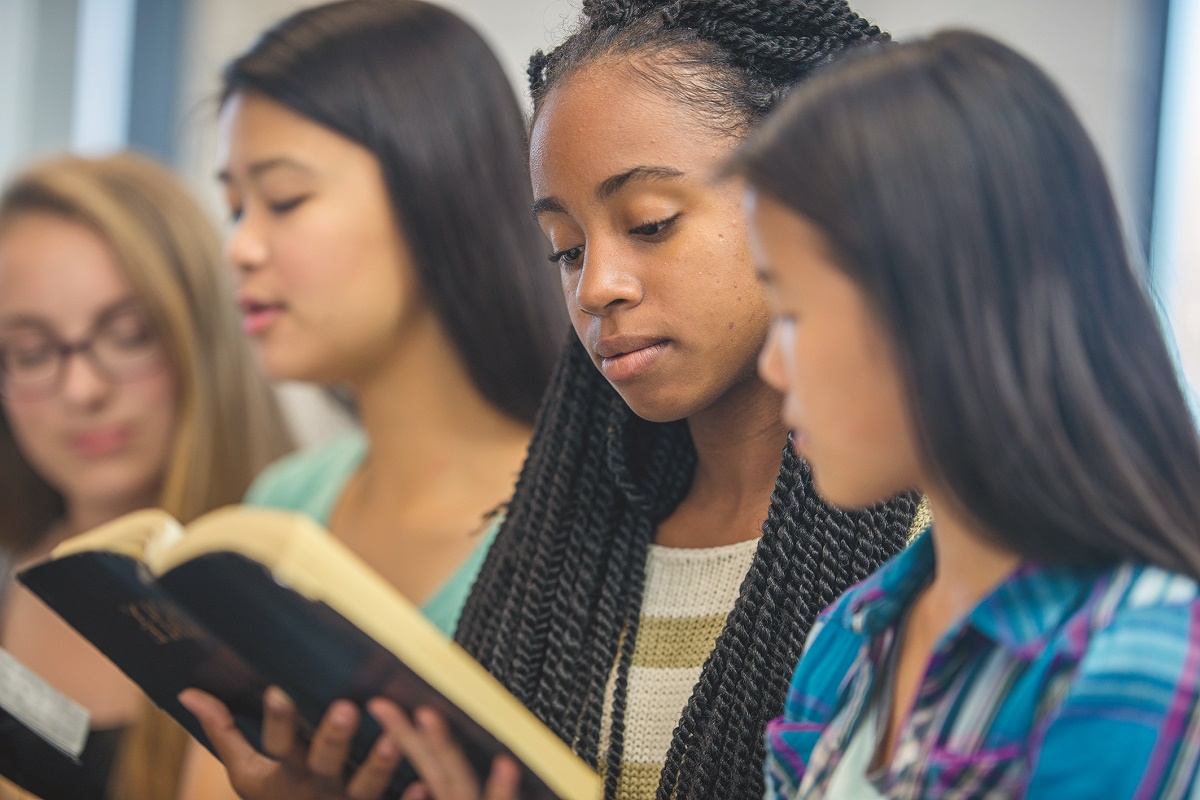
Role models help to guide young women on their journey of faith.
Sherrin agrees that it’s not always an easy role, but says courage and determination will stand prospective female ministers in good stead.
“I sometimes think women have to be a bit tough, so you’ve got to have a bit of a backbone,” she says.
“Sometimes in churches, even in Uniting churches where we’re pretty supportive of women in ministry, we don’t always see the woman as an individual and so aren’t always as ready to meet them as we should be.
“So, yeah, I think you’ve just got to be courageous and give it a go and if it’s meant to be and it’s what the Lord is calling you to, it will happen.”
When beginning that journey, the importance of role models should never be underestimated, says Sandy.
“The first piece of advice I would give to women considering ministry is to get themselves a good female role model,” she says.
“Whoever it is doesn’t need to be ordained, she just needs to be a woman of faith you can have conversations with and can help you discern.
“That role is actually one I fulfill quite a bit and it sits well with my background as a teacher in terms of being able to mentor people.
“Quite often, the path towards being ordained is one of deepening discipleship and deepening faith formation.”
Sandy remembers her own path towards ministry being an easier one to tread thanks to wonderful support from an outstanding mentor.
“I did my period of discernment in 2006 and I was very fortunate to have a very strong lay woman, Valma Edwards, as my POD mentor,” she says.
“Valma is an incredibly inspirational and strong woman who had an outstanding career in education.
“I found her mentoring during that period of discernment really helpful.”
Cynthia says the period of discernment for ministry candidates plays a hugely important role and her own positive experience means a mentoring role appeals to her.
“Based on my experiences, I would certainly be happy to be a mentor to a young women considering the ministry,” she says.
“I think the period of discernment a candidate undertakes is a fantastic process and experience for them.
“Whether a woman ends up deciding to candidate for ministry or not, it’s such a worthwhile and helpfully formative thing to do.”

The concept of ‘every member ministry’ is a key driver within the Uniting Church.
Every member counts
While female ministers have a fundamentally important role to play within the Uniting Church, they are just one group of women doing outstanding work in spreading God’s word.
At the heart of the contribution women make at every level is the concept of “every member ministry”.
As National Assembly president Deidre Palmer explains, “every member ministry” is grounded in the understanding that all Christians are called to be engaged in the ministry of Christ.
“It has been a characteristic of the Uniting Church from the very beginning and it’s a Biblical understanding that every member has a gift to be used in building up the Body of Christ and equipping us for service in the world,” Deidre says.
“So the understanding of “every member ministry” is that all of us are called to ministry and we may exercise that ministry as ordained or lay leaders, working with respect and mutuality.
“Every member ministry” is seen as we respond to God’s call to live our Christian vocation, wherever we are living, working and building relationships.
“(It is also) a call to responsibility, to embody in our daily lives the love and hope of Christ.”
Deidre says regardless of which path women in the Uniting Church choose to take, they can rely on the type of support that allows them to fulfil their true potential.
“They can follow whatever pathway they think God is calling them along,” she says.
“Obviously it depends on the individual woman and what gifts they bring … they may bring gifts of teaching or witnessing faith in terms of evangelism, healing in terms of the medical profession or gifts of compassion and care.
“That compassion may be expressed in a variety of ways, through social justice advocacy or wonderful proclamation of the word if they are preaching or through community development work.
“So if you are a young girl growing up in the Uniting Church, you can express the gifts that God has given you in whichever way you are called and the church will walk alongside you.”
Deidre uses personal examples to show that support from the church can come in a number of ways.
“For example, I have encouraged young women in the Uniting Church as they have explored a call to ordained ministry through a period of discernment,” she says.
“And I have also journeyed with young women who are responding to a call to be a teacher, a social worker, a doctor, a speech therapist, a community development worker or an artist.
“One of the reasons these women are able to flourish and grow into their fullest humanity is because they are part of a church that affirms their equality and giftedness, created in the image of God.
“We see through the life and ministry of Jesus, the raising up of women as apostles, prophets, teachers, evangelists and leaders in the life of the early Christian movement.
“This Biblical witness is foundational to who we are as the Uniting Church.”

